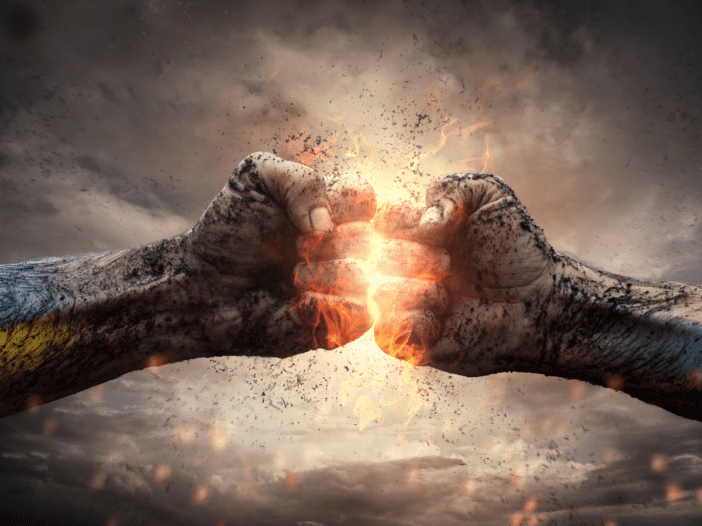Do you sense it too? Oceania is still at war with Eurasia for now, but East Asia better look out…
That’s a reference to George Orwell’s Nineteen Eighty-Four, not anything going on in the news in East Asia or Eurasia. Although, it does fit rather well…
Orwell’s real point was about history being changed:
‘Who controls the past controls the future: who controls the present controls the past.’
I know that sounds annoyingly cryptic, but let’s take a closer look.
How is the present controlled? Via the media, political pronouncements, and, of course, social media.
This allows you to redefine the past and thereby how people think about the future.
For example, back when vaccines were designed to stop the spread of COVID, I considered getting them. In the end, I had to in order to attend the birth of my daughter.
But there’s something I’ve noticed since. People keep telling me that the vaccines were never supposed to stop the spread of COVID. They were only ever supposed to prevent death and hospitalisation. Sorry, reduce deaths and hospitalisation.
See it now? Control the present and you can control the past. Control the past and you can control the future. Including whether I get vaccinated or not. The premise was, after all, that I wouldn’t spread it to anyone in the hospital.
It seems to me that the past is being re-rewritten when it comes to Ukraine too.
Ukraine’s president, having gone from corrupt villain to international hero when the war broke out, is back on his way to being a villain again. It hasn’t happened yet, but he’s certainly peaked.
This might not seem relevant to you, but I’m worried it could be incredibly important to investors. It may herald the beginning of the end of our inflation spike, gas boom, energy crisis, recessions, and plenty of other trends that are dominating the news cycle and financial markets.
So we’re not just talking about the front cover of Vogue…
I better explain.
In March, French politician Marine Le Pen argued that sanctions on Russia ‘would mean sanctioning the French people, French enterprises, the French economy which would need years to recover’. She also said that ‘trying to harm Russia by committing harakiri is a poor method’.
Why the elaborate metaphor? ‘In this case, our economy is running the risk of dying first and it seems like nowadays that’s what we are aspiring to do.’
The Japanese would agree with this analysis, having dragged their feet on sanctions for this reason. And they haven’t had the same energy crisis or inflation as a result. The Japanese economy’s bowels are intact.
With French electricity prices now around 10-times higher than in the years before the pandemic, with France’s EDF facing a €5.3 billion loss instead of record profits on record electricity prices, and with France facing blackouts, I think Le Pen was only exaggerating a little with her metaphor.
Then again, it isn’t winter yet…
Le Pen isn’t waiting for the proof or the pudding, though, recently telling the French Parliament that they need to end the sanctions now:
‘Europe is going to face a blackout, notably on the question of Russian gas imports. These sanctions are simply useless. All they do is make Europeans suffer. And that, incidentally, includes French people.’
France’s minister for energy transition, Agnes Pannier-Runacher, responded by saying Le Pen ‘may pride herself as being the most patriotic politician, but she’s actually the first to be ready to sell [France] for a plate of lentils to Russia’.
Given the rate of inflation in Europe, and the cost of cooking oil let alone gas, the French probably responded, ‘cooked or uncooked?’.
My point is that those radical politicians around Europe arguing for an end to sanctions on Russian energy are likely to get the upper hand in coming months as winter approaches and energy prices remain high. And that portends a change in policy amongst the mainstream parties eventually.
Rationing for someone else’s benefit is not so popular. Especially when they’ve been weaselling away money in offshore tax havens and making donated military equipment disappear.
Once Russia invaded, you weren’t supposed to talk about such things anymore. Until now.
In Germany, Die Welt’s article, which I’ll translate part of, has the headline ‘President Zelensky’s Secret Business’.
‘The exposure of offshore accounts, a film that cannot be shown and then “Wagnergate”. Two journalists uncover in which war Ukraine already found itself in the Summer before Putin’s ambush. Especially, a scandal that exposes the President.’
Suddenly, all the old Ukraine scandals are back. And some new ones too. The Germans are also keen on those lentils, it seems…
You know you’re in trouble once even the media is willing to criticise you. But get this, Amnesty International published a report heavily criticising Ukraine for using Ukrainian civilians as human shields in the war.
Unfortunately, that got one step ahead of what’s considered acceptable in the media and Amnesty International had to apologise:
This bit probably made Julian Assange weep: ‘Amnesty International deeply regrets the distress and anger that our press release on the Ukrainian military’s fighting tactics has caused.’ Usually, using civilians as human shields is supposed to cause distress and anger. But when it’s your side that’s doing it…
Another sign of the loosening reigns on Russia is the release of the turbine, which Gazprom needs to operate Nord Stream 1. The Germans even made a song and dance about how available it was and how there’s nothing stopping it from being used anymore. That’s very different to their proud announcement of sanctions…on their own energy supplies…
The EU has also delayed the decision to shut Russia out of maritime insurance — a move which the Financial Times had described as ‘the most comprehensive restriction to date’.
Some sanctions are already being lightened, as the Financial Times reported:
‘Brussels in late July amended some curbs on dealing with state-owned Russian companies, citing concerns over global energy security.’
Despite all the tough talk, ‘There is no current UK ban affecting global shipments of Russian oil’, according to Patrick Davison, underwriting director of the Lloyd’s Market Association.
And get this, also from the Financial Times:
‘Sarah Hunt, a partner at HFW, a law firm, said trading houses were inquiring whether it was now legal to buy Rosneft oil to ship to countries outside the EU.
‘“The new EU sanctions effectively permit the lifting of Russian crude by European companies. We were surprised by this,” she said.
‘Leigh Hansson, partner at Reed Smith, another law firm, said the EU’s sanctions amendment was a “big retreat”, adding that lawyers had also been expecting “more robust” measures by now from the UK.’
If I’d used the words ‘big retreat’ over the war in Ukraine, there would’ve been some nasty name calling in my inbox…
The reasons why these shifts are occurring is obvious. The signs of Europe’s struggling economy are getting too painfully obvious.
From Bloomberg: ‘Across Europe, Gas-Strapped Cities Prepare to Power Down’:
‘Energy-saving limits on lighting and air-conditioner use have drawn heat in Spain, France and Germany.’
(My in-laws in Barcelona suddenly claim they can’t speak Spanish and are unable to understand the news…)
‘German Oil Refiner Is Seeing “Run on Heating Oil and Diesel”’ reports Bloomberg.
The chemicals manufacturing giant BASF is shutting down 80 plants. Which is going to have some significant flow-on effects.
In Germany, Christian Democrats’ deputy parliamentary leader, Jens Spahn, said the government’s preparations for winter could be summed up as ‘Live cold, shower cold, catch cold’. So it’s not just the extreme parties questioning things.
Another reason I’m expecting a Putin pivot from the Europeans is the growing discontent between European governments. Just check out these headlines:
The Guardian: ‘Britain may stop supplying gas to mainland Europe if hit by shortages’.
The Telegraph: ‘Britain dependent on imported power to keep lights on this winter, says National Grid’.
The Express: ‘“Norway first!” Panic as UK’s BIGGEST importer of gas poised to cut supplies off’.
And my personal favourite, also from The Express: ‘UK facing heat pump crisis as EU bows to eco mob and bans critical supplies’.
Governments also weren’t very keen on the German plan to share their gas reserves.
The coalition against Russia are turning on each other.
So, if you ask me, governments and the intelligentsia are preparing you for a radical change in policy. They’re preparing to use their control of the present to change the past and make a future less anti-Russia.
This could pull the rug out from oil, gas, and other energy prices, ending the energy crisis and the inflation crisis too.
In a few years’ time, everyone will have forgotten what the fuss was about. At least there won’t be any lasting side-effects…
Until next time,
 |
Nickolai Hubble,
Editor, The Daily Reckoning Australia Weekend

